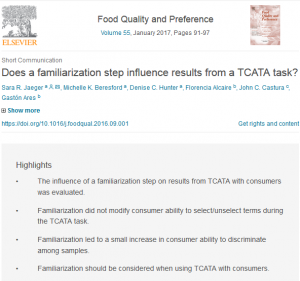Does a familiarization step influence results from a TCATA task?
 Temporal Check-All-That-Apply (TCATA) is a multi-attribute temporal approach that extends CATA questions. It is based on continuous selection of the sensory attributes that are perceived as applicable for describing a focal sample during consumption. Compared to CATA, TCATA is a relatively intense and demanding task for consumers who have to focus their attention on the evolution of the sensory characteristics of samples during consumption. The present work evaluated a short familiarization step (7–10 min) where participants became acquainted with the list of sensory terms and applied these to a practice sample using a CATA task and also completed a TCATA task using a warm-up sample. All participants, including those who did not take part in the familiarization step, watched a demonstration video that explained how to use the TCATA software and to complete the task. Three consumer studies, each involving ∼100 participants, were conducted using dried apricots, peanuts, and milk chocolate. The TCATA curves when data were collected with and without the familiarization step were not systematically different. However, a small increase in sample discrimination was established and on this basis familiarization should be considered when using TCATA with consumers. A need to explore other familiarization protocols than the one used here exist in order to develop guidelines for implementation.
Temporal Check-All-That-Apply (TCATA) is a multi-attribute temporal approach that extends CATA questions. It is based on continuous selection of the sensory attributes that are perceived as applicable for describing a focal sample during consumption. Compared to CATA, TCATA is a relatively intense and demanding task for consumers who have to focus their attention on the evolution of the sensory characteristics of samples during consumption. The present work evaluated a short familiarization step (7–10 min) where participants became acquainted with the list of sensory terms and applied these to a practice sample using a CATA task and also completed a TCATA task using a warm-up sample. All participants, including those who did not take part in the familiarization step, watched a demonstration video that explained how to use the TCATA software and to complete the task. Three consumer studies, each involving ∼100 participants, were conducted using dried apricots, peanuts, and milk chocolate. The TCATA curves when data were collected with and without the familiarization step were not systematically different. However, a small increase in sample discrimination was established and on this basis familiarization should be considered when using TCATA with consumers. A need to explore other familiarization protocols than the one used here exist in order to develop guidelines for implementation.
![]()
Jaeger, S. R., Beresford, M. K., Hunter, D. C., Alcaire, F., Castura, J. C., & Ares, G. (2017). Does a familiarization step influence results from a TCATA task? Food Quality and Preference, 55, 91-97. https://doi.org/10.1016/j.foodqual.2016.09.001